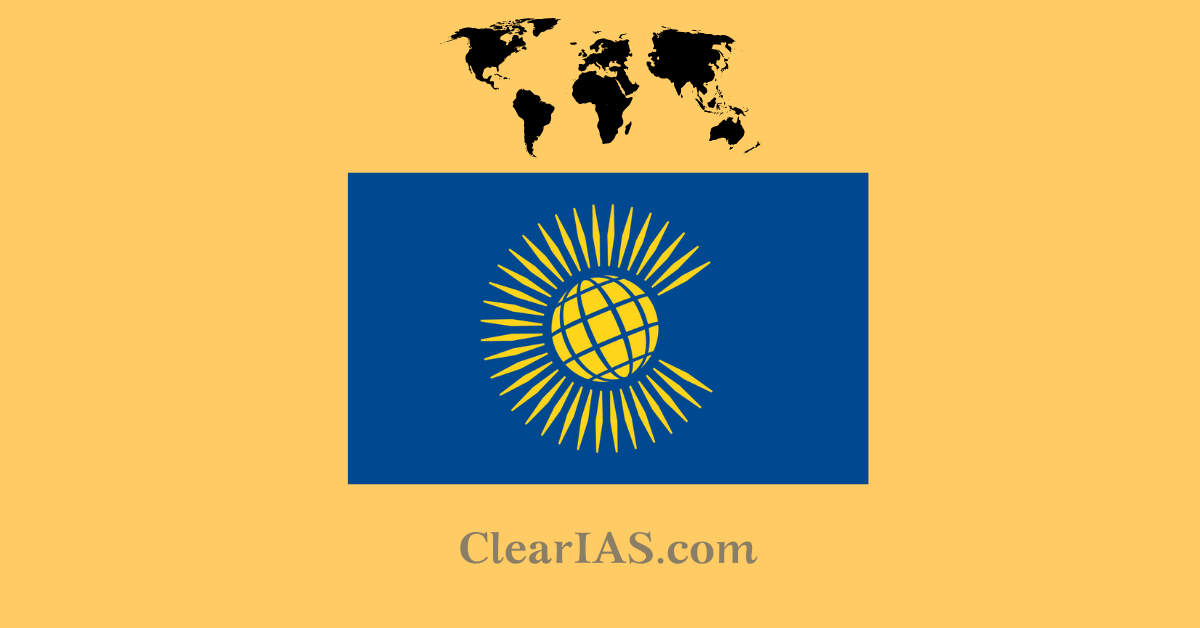
What is the Commonwealth of nations? What is the history of the association? What is India’s relation with it? Read to know more.
Barbados has elected its first-ever president to replace Britain’s Queen Elizabeth as head of state in a decisive step toward shedding the Caribbean island’s colonial past.
What is the Commonwealth of Nations?
The Commonwealth of Nations is a loose association of 54 independent sovereign states and dependencies, most of which are former colonies of the United Kingdom.
The British Monarch remains the head of the association hence the Queen of the United Kingdom- Elizabeth II is given the title of Head of the Commonwealth.
This title doesn’t hold any political power over its member countries. Usually, countries with any constitutional link to the United Kingdom are given membership, but Rwanda and Mozambique do not have historical ties to Britain yet they have been given membership.
History of the commonwealth:
The Commonwealth has its roots in the imperial conferences of the late 19th and early 20th centuries when some of the colonies within the British Empire began to acquire greater autonomy.
-
- 1926: Balfour Declaration
- 1931: Statute of Westminster
- 1949: Ireland becomes a Republic
- 1950: London Declaration
The modern form of the association took shape after the independence of India and Pakistan in 1947.
- 1950: It changed from “British commonwealth of nations” to “Commonwealth of nations” and became an association for decolonized nations but the British monarch remained the official head of the association.
- 1965: Commonwealth Secretariat is established which is the main intergovernmental agency and its Central institution.
- The Commonwealth had no constitution until it adopted its Charter in 2012.
- Commonwealth heads of governments meet (CHOGM) is held every 2 years to discuss issues of common interest.
- Commonwealth members have no contractual obligations, but members commit themselves to the statements of the beliefs set out in the charter.
- 1995: The Commonwealth Ministerial Action Group (CMAG) was set up to deal with governments that persistently violate Commonwealth principles.
- 1980: The association members focused on the campaign against apartheid.
- 1995: It suspended Nigeria’s membership after the military regime passed a death sentence pf a writer.
- 2000: It suspended Fiji after the overthrow of the elected government.
- 2002: Zimbabwe was suspended after elections were marred by violence and intimidation. The Zimbabwean government left the commonwealth.
- 2013: The Gambia announced its withdrawal, though they joined again in 2018.
What are a republic, monarchy, and dominion?
- A Republic has a President who is the head of state.
- Monarchies and Dominions have a hereditary monarch as head of state.
- In both cases, governments may be a parliamentary democracy headed by the prime minister or authoritarian.
India’s membership:
- India was a dominion from 1947 to 1950 till our constitution became effective.
- India’s constituent assembly ratified the membership of the association in 1949, declaring continuation of full membership.
- India remained a member as it would be beneficial in the economic, political, and cultural aspects of the international scenario.
- India has been playing an important role at the Commonwealth heads of government meet (CHOGM).
- India also hosted the 24th commonwealth summit in New Delhi in 1983.
Benefits of being in the Commonwealth:
- Membership of the association brings benefits through the Commonwealth Fund for Technical Cooperation (CFTC).
- The association promotes economic and social development and the alleviation of poverty.
- The Commonwealth Games are a major international event in the sporting world.
As the ‘Brexit’ from European Union got finalized, the United Kingdom has hopes that its Commonwealth partners can help boost trade in the coming times. The association’s fast-growing economies, bolstered by a common history and shared language, offer an ideal platform for the UK to advance its trade agenda and deepen ties with like-minded countries.
Members of the Commonwealth of Nations:
All the 54 members have an equal say regardless of size or wealth. This makes sure even the smallest countries have a voice in shaping the Commonwealth. 15 countries have Queen as the head of state.
Africa:
- Botswana
- Cameroon
- The Gambia
- Ghana
- Kenya
- Kingdom of eSwatini
- Lesotho
- Malawi
- Mauritius
- Mozambique
- Namibia
- Nigeria
- Rwanda
- Seychelles
- Sierra Leone
- South Africa
- Uganda
- United Republic of Tanzania
- Zambia.
Asia:
- Bangladesh
- Brunei Darussalam
- India
- Malaysia
- Maldives
- Pakistan
- Singapore
- Sri Lanka
Caribbean and Americas:
- Antigua and Barbuda
- The Bahamas
- Belize
- Canada
- Dominica
- Grenada
- Guyana
- Jamaica
- Saint Lucia
- St Kitts and Nevis
- St Vincent and the Grenadines
- Trinidad and Tobago
Europe:
- Cyprus
- Malta
- United Kingdom
Pacific:
- Australia
- Fiji
- Kiribati
- Nauru
- New Zealand
- Papua New Guinea
- Samoa
- Solomon Islands
- Tonga
- Tuvalu
- Vanuatu





